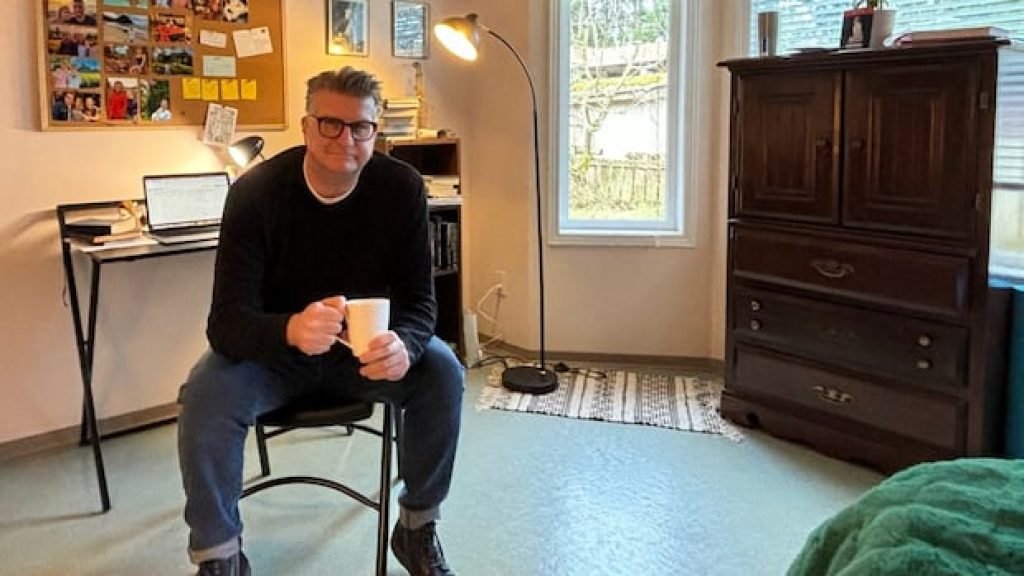
This First Person column is written by Jordan Kawchuk, who lives in Duncan, B.C. For more information about First Person stories, see the FAQ.
I currently live with 20 other men.
At 52, I never imagined having to explain a roommate, let alone 24 of them — half of whom are straight out of prison. This is my fifth alcohol addiction treatment centre in 20 years. These liminal, lucid places of recovery reset my psyche and sobriety — but damn, if I have to do this again.
Each time, I genuinely think, “This might be the one to finally keep me sober.“ But despite good stretches of sobriety and big wins in love, family and jobs, relapse is part of my story. It has nothing to do with being a lush, lacking willpower or having some moral failure. Alcoholism is a bio-phycho-social-spiritual disease; it hijacks my brain, body and spirit right when life is absolutely wonderful.
I grew up imagining the alcoholic as a derelict drifter riding the subway in a crumpled fedora. But alcoholism doesn’t discriminate. We come in all shapes and sizes.
Me? I like to think I’m a pretty nice guy. A professional, educated and musical dad who pines to see his daughters again.
But when I slide into that hole of desolation, twisting with animal fear, my disease turns oppressive. It sets my life and those of my loved one’s lives on fire. I’m no longer in the doghouse when I drink — drinking takes me past the doghouse, directly into shelters and hospitals, after which I willingly queue up for detox clinics and treatment centres to rebuild my life.
So, here I am again.
No two treatments are alike, but my experience follows a general pattern.
The first week is the toughest. I’m discharged from detox with a duffle bag, shown to my space and meet a leery new roommate. On a corkboard above my single bed, I pin up my photos of loved ones — creased photos with pin holes from the last place. I sign papers, read the rules and, while on restrictions for the first weeks, I live indoors under the unbearable weight of shock, shame and jarring displacement.
But the next weeks feel more promising. Everyone loves to help out the new guy and the house is generally friendly. The model of a fresh program always excites me, and I write a long email to my loved ones, full of anecdotes, assurance and hope.
“This might be the one.”
The following weeks slow to a sandpaper grind as I accept the residence as my reality. I navigate homesickness, fear and unpredictable housemates. At the same time, I find comfort in routines like mandatory group meetings, embrace the joy others find in family forgiveness and share hope with big-hearted people, as we talk late into the night.
Treatment is an emotional dance. Gratitude for new beginnings and despair of the past oscillate in my chest. Having landed in the weeds again, I start bushwhacking my way out, not knowing what awaits in the clear. This is my job now. To get well, to get back and try again.
I’ve been in a high-end facility with university-level lectures, ornate fountains and five-star food. I’ve been in a publicly funded house that sat next door to a biker house and slept us six to a room. I’ve shared spaces with surgeons and I’ve shared rooms with jailbirds (both of whom know how to fix a broken nose, just in different ways).
Davy Short says he just wants to get sober, but first he needs to get off the street. Short has been homeless for months, and says he can’t get into alcohol rehab without a place to live when the program ends.
Every treatment centre follows the same quotidian customs, no matter the sheet count or counsellor credentials. We make our beds, line up for meals, endure random room checks, attend groups and follow a buddy system on Dollarama excursions for cheap candy and chips (there is always a dollar store near treatment). The chores are always the same: mopping, dish duty, toilets and keeping the smoke pit clean — something I always find unfair as a non-smoker in these joints.Still, for all the uniformity and structure each centre promotes, the recovery bubble exists in a paradoxical state. These are places where the profound and ridiculous vie for attention.
I’ve experienced transformative tears in sharing circles and seen redemption light up a room. Then again, I’ve seen board game brawls and charades shut down for shoving. Contemplative mornings have led to deep connections with peers — perhaps the only people who truly understand this insanity. On the other hand, I’ve been called emasculating names for reading books and wearing colourful socks. You take the good with the worst.
I always strive to be the star student with my collared shirts and stacks of Moleskine journals. Yet without fail, the most exasperating, disruptive bro of the bunch — the gym rat who thanks protein shakes in the gratitude circle — has been sober way longer than me. It frustrates me, then it humbles me.

Dichotomies like this help erode my ego and expectations, which is the very core of transformation. This is the heavy lifting being done in every treatment centre, with revelations that move us from broken to true. I cannot think my way out of this disease. When I surrender that notion, and I give rather than get, the magic takes shape.
I see the magic in a young man’s face when his anger melts away day by day. I get apparitional shivers when we all hold each other up. I feel the vocal vibrations in my brothers’ backs when we circle up to recite the serenity prayer each evening. Something is at work here.
I write this piece during my second month in this treatment centre. Right now, my honey is in Hawaii, my best friend is beginning a book tour and countless other friends share their successes online.
I have to shut that stuff out. Outside this facility, life is running like horses over the horizon, and I am here to heal in this stationary society of beautiful madmen.
Today was difficult. Two great guys were kicked out of the treatment centre when, off their restrictions and allowed out alone, they scored booze and drugs and tested positive. We moved forward. We held them in our hearts. We did our chores and our homework. And we nodded to one another in the hallways of this old building, as if to say, this just might be the one to keep us sober.
Do you have a compelling personal story that can bring understanding or help others? We want to hear from you. Here’s more info on how to pitch to us.









